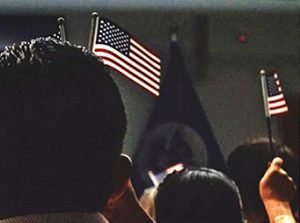Across the Border & From Abroad – Foreign Workers Face Hurdles
Click here to read the complete article88 – May/June 2019
By Delores Kuhlwein
 Behind the much-publicized issue of immigration stands a frequently overlooked population that imparts considerable influence on our hobby: the non-citizen workers who have a desire to be part of the horse industry here in the United States. Whatever your viewpoint on the complex topic of immigration, there’s no doubt that apprentice or guest workers are responsible for many of the behind-the-scenes tasks that turn horses into champions.
Behind the much-publicized issue of immigration stands a frequently overlooked population that imparts considerable influence on our hobby: the non-citizen workers who have a desire to be part of the horse industry here in the United States. Whatever your viewpoint on the complex topic of immigration, there’s no doubt that apprentice or guest workers are responsible for many of the behind-the-scenes tasks that turn horses into champions.
What’s not broadcasted, however, are the challenges faced by workers who come to America, and those struggles can number in the thousands. Sometimes, visas for highly-skilled, guest workers with equine experience can be denied due to changing laws, as detailed on March 22nd, 2019, by the Paulick Report. The Paulick Report informed horse racing fans that Todd Pletcher, a Thoroughbred trainer whose horses participate in races such as the Belmont and Saratoga, applied for H-2B Visas for his 50 guest workers. For the first time, they were denied due to a 66,000 cap for 2019, which has resulted in a huge impact on the approximate 100 horses Pletcher brings to Saratoga, and he’s scrambling to find qualified replacements.
The plight affects the horse show industry just as deeply, inspiring The Equine Chronicle to interview foreign workers in the show horse industry–and the trainers who host them–to help understand how the guest apprentice positively influences the industry and what limitations and struggles they face.
The Appeal
For the horse enthusiast from across the border who wants to take the next step toward becoming a trainer, opportunities to expand education abound in the U.S.
Randi McCook, an aspiring horse trainer from Ponoka, Alberta, Canada, experienced very early in life what knowledge could be gained in the U.S. “I’ve had horses in training in the U.S. and traveled back and forth to shows since I was a kid. I’ve trained with Arturo Maestas and Jesse Jones of Maestas Show Horses for the past four years, because I wanted to learn from two highly-talented trainers and get a strong foundation before stepping out on my own as a horse trainer,” she reveals.
Originally from Sydney, Australia, Lauren Louw knew working in the U.S. was important because she would be afforded more chances to ride, learn, and show on a larger scale, which she eventually found as an assistant for Ty and Karen Hornick. She says, “It was also appealing because the U.S. is the pinnacle of AQHA. Growing up, I idolized the people, the horses, and I wanted a chance to live that life.”
Click here to read the complete article88 – May/June 2019










